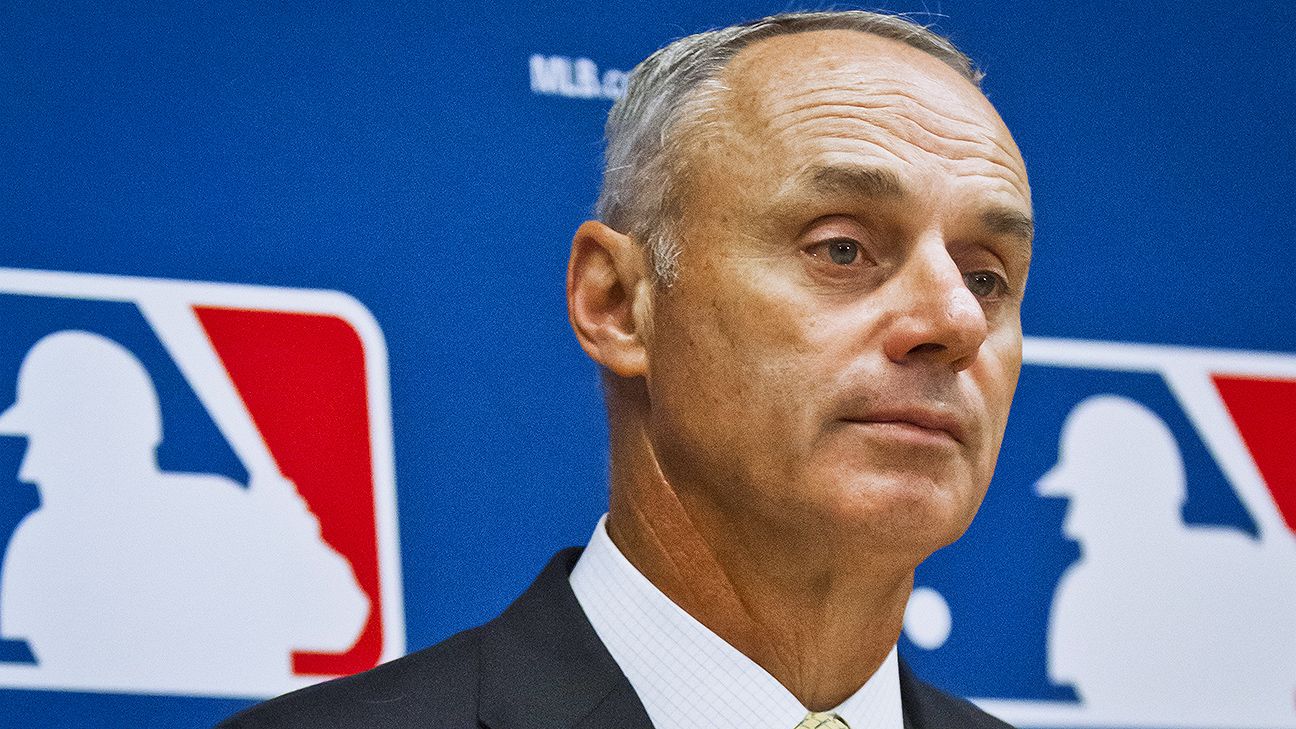NEW YORK — Good but unexceptional veterans must realize teams find them less valuable in the age of analytics, Baseball Commissioner Rob Manfred maintained ahead of season openers.
Players have expressed anger following the second straight slow free-agent market, one that saw record deals for top stars and plummeting prices for many journeymen.
“Obviously what the clubs are saying, the Bryce Harpers, the Mike Trouts, these free agents, Manny Machado, they have tremendous value,” Manfred said Wednesday.
Then he cited the example of a 33-year-old player with a 1 Wins Above Replacement last season.
“That price has been disappointing for some players, but that’s the market,” Manfred said. “What we’ve said to the players is look, if that’s your issue, you’ve got to tell us. That’s a distribution issue. That means some guys are getting too much. Some guys are getting too little. We’re largely agnostic on that one.”
Manfred was interviewed by New York Yankees broadcaster Michael Kay during a breakfast at The Paley Center for Media. Manfred said front offices have transformed since the days when general managers made decisions based on numbers in the Baseball Register.
“Now all these clubs have algorithms that you pump in how they perform, what their ages (are), and it tells you on a predictive basis what you’re going to get from that player,” Manfred said. “Players will say to you, I’ve served my six years, right? I’m entitled in free agency to get a multiyear contract at X level. The fact of the matter is, what the club is saying is I’m not paying for you for what you did the last six years, I want to see what I’m going to get going forward. You’re not going to be able to change that.”
Players have since 1976 been able to become free agents after six years of major league service. They are eligible for salary arbitration after about 2 2/3 years of service.
“The single biggest feature of our economic system that allows small-market clubs to compete is the six-year reserve period,” Manfred said. “With the exception of salary arbitration wins and losses, their cost is fairly predictable, right? So that allows those small markets to compete. You start shaving those reserve years, what’s happened in other sports, when they’ve moved down the free-agency year, they’ve gone to a cap in order to preserve competitive balance. Our union has always opposed to a cap.”
Manfred rejects claims by the players’ association that jettisoning veterans in favor of rebuilding is tantamount to not trying to win.
“Tanking is my least favorite word in the English language,” he said. “They know analytically to go out and sign a $15 million a year free agent, that may give them one or two more wins, it’s just not worth the investment for those one or two wins. That player is not going to make a difference. They’re better off taking that money holding on to it and paying the group that they’re bringing along as they start to mature.”
On the offseason’s other big labor topic, Manfred remains intent on pushing ahead with a rules change for 2020 that would require pitchers to face at least three batters or end a half inning.
“We think less pitching changes makes the game shorter and forcing the pitcher to at least pitch to three increases the likelihood that the hitter may have an outcome that produces action in the game,” he said.
Players refused to accept that change for 2019, but baseball’s collective bargaining agreement gives management the right to unilaterally alter playing rules with one year of advance notice. Manfred regrets that provision was agreed to in the 1970s, believing it is difficult for teams to press ahead with a proposal that was bargained over inconclusively.
“It’s always a mistake when you give up a fundamental management right, and it does create leverage for the players in terms of what is a game going to look like,” he said.
To speed the pace of play, baseball plans to shorten inning breaks for the second straight season.
“Every time you have an inning break during a broadcast, it’s an opportunity for the viewer to tune away and maybe not tune back,” he said.
Baseball also is using the independent Atlantic League for experiments, such as increasing the distance from the mound to home plate to 62+ feet from 60 feet, 6 inches. When Kay suggested pitchers would get injured, Manfred quipped: “That’s why we’re doing it in the Atlantic League.”
